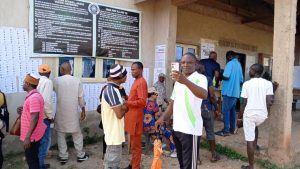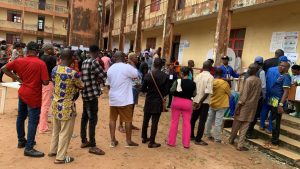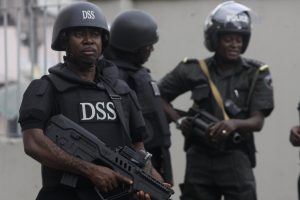Consultant Facilitator at International Alert

International Alert is one of the world’s leading peacebuilding organisations, with over 30 years of experience supporting communities, advising governments, organisations and companies on how to build peace. Alert works with people in conflict-affected and threatened areas to make a positive difference for peace; to improve the substance and implementation of international policies relevant to peacebuilding; and to strengthen the peacebuilding sector.
We are recruiting to fill the position of:
Job Title: Consultant Facilitator
Location: Nigeria
Background
International Alert (Alert) is an international peacebuilding non-governmental organisation working with people directly affected by conflict to find peaceful solutions towards a world where people resolve their differences without violence and can build a more peaceful future for their families and communities. Alert works in over 30 countries and territories and has offices in 18 countries.
Alert has worked in Yobe state since 2019, on an EU funded project titled, “EU Support to Early Recovery from Conflict and Resilience building in Yobe state”. We have been working in 3 Local Government Areas of Damaturu, Gujba and Potiskum of Yobe state. Our programmes are implemented alongside local partners in Yobe state through working with existing state and local institutions and communities, women and girls affected by violent conflict and youths, through capacity building initiatives on peace building and social cohesion, support sessions for Women and Girls, Community Dialogues on re-integration and reconciliation and Family support sessions for Families of returnee survivors of sexual and gender based violence by NSAGs .We provide technical assistance to the consortium on mainstreaming Conflict and gender sensitivity on the EU resilience project.
Alert’s social cohesion programme in Borno State began in 2015 with a peacebuilding assessment on reintegration opportunities for women, girls and children associated with Boko Haram in Borno state. Our Bad Blood report provided analysis of the rejection and stigma faced by victims of violence by extremists, and largely contributed to shaping the discourse around reintegration and the need to deliver frontline peacebuilding work to reduce the risks of further violence in a future post-insurgency period. Hence the expansion of Alert’s Social cohesion project to Yobe state.
Context
Due to the wide-sweeping nature of Non state Armed Groups in Northeast Nigeria who are fighting to overthrow the government and create an Islamic state since 2013, social cohesion remains weak in Yobe State. Suspicion among families, neighbours, community members and leadership continue to present challenges. Those that were associated with Boko Haram in the early days of the conflict are seen as complicit with the insurgents and community dynamics are often laden with violent interactions, even in accessing social services. Women and girls captured, abused or forced into “marriage” by Boko Haram bear the stigma of their association, and their children are suspected of having “bad blood”. This fear of “contagion” and of suicide attacks by women and children is part of a deeper problem.
Yobe state currently hosts 124,909 IDPs, witnessing the steepest increment (19%), with 19,598 new arrivals in February 2018 compared to the previous assessment in 2016 (The joint Federal and State government, EU, World Bank and DFID Recovery and Peace Building Assessment (RPBA) conducted in 2016). It is estimated that about 48% of IDPs are girls and young women, most of whom are at risk of Sexual and Gender Based Violence (SGBV) due to living in crowded, culturally inappropriate conditions. Some were abducted by Boko Haram[1](leading to stigmatisation) while others have developed negative coping mechanisms such as engaging in transactional sex or giving young girls away in marriage. Society in the NE of Nigeria is highly patriarchal, where men dominate all spheres of women’s lives, usually controlling family resources. However, since the conflict, women are increasingly the targeted recipients of humanitarian assistance, sometimes leading to further domestic violence where community sensitization and consultations have not been integrated. Adolescent girls are the most at-risk of SGBV, as they are often targeted while performing basic tasks such as travelling to water points, collecting firewood to cook food, going to the communal latrines and even on the way to or at school. According to the Recovery and Peacebuilding Assessment (RPBA), there are also large, estimated numbers of unaccompanied and separated children (UASCs) in Yobe state. As of July 2018, 18,302 (9,494 male and 8,808 female) have been captured in the Child Protection Information Management System managed by the United Nations International Children’s Emergency Fund (UNICEF).
Immediate action is needed to promote peaceful coexistence in communities torn apart by conflict and mass displacement. In particular, the conflict dynamics around the reintegration of the thousands of men, women, boys, girls and children associated with Boko Haram needs specific attention.
In coordination with our national partners/subgrantees, we have organised a series of activities at various levels to reduce stigma against women and children associated with Boko Haram and opened a space for their reintegration into the society. At the individual level, we have worked with women and girls’ survivors of violence to develop networks where they felt empowered to express themselves on the challenges they face and access to peer-to-peer social support. At the family level, we have facilitated reconciliation between survivors and their family members. At the community level, we organise dialogues for community members to better understand the experience of the survivors and the necessity of their reintegration to facilitate peace building and social cohesion in their communities.
Alert’s programming aims to enhance state government’s capacity to lead, oversee, strengthen, and expand its social protection system to address basic needs and critical deprivations, alongside increased state and community capacity to facilitate reconciliation and social cohesion.
To achieve this objective, Alert will:
- Build state and non-state actors’ capacity at all levels to facilitate multi-stakeholder dialogues and problem-solving relating to conflict resolution and social cohesion challenges.
- Create joint platforms for state and non-state actors to organize and facilitate joint problem-solving and multi-stakeholder dialogue sessions with community members on social cohesion challenges
- Build capacity of traditional and religious leaders, social welfare officers to facilitate conflict resolution practices such as problem-solving workshops, multi-stakeholder dialogues, while ensuring gender is mainstreamed
- Mapping of state- and non-state initiatives relating to youth engagement to develop gender sensitive youth programmes to promote peacebuilding and social cohesion: Alert will use its conflict and gender sensitive political economy analysis (PEA) tool to identify the challenges to young people’s engagement in social cohesion and peacebuilding efforts.
- Mapping and assessment of conflict, community structures and existing services: a review and analysis of key documents, policies, reports, programmes and national frameworks related to existing services at the community and state level in Yobe such as the Durable Solutions Strategy, RPBA and the Yobe State Development Plan (SDP). We will identify functioning peacebuilding systems and processes that sustained the periods of violent conflict, or those that existed but were destroyed during the period of violent conflict. IA will use this mapping exercise to clarify the political, economic and sociocultural context and emerging issues; the structural causes of conflict and the new factors and actors that contribute to prolonging the conflict.
- Study on community challenges, perceptions, positions and recommendations for reintegration of men, boys, women, girls and children who have been associated survivors of SGBV with Boko Haram. Since 2016, the context in the North East has evolved greatly and the challenges to the reintegration of women, men, boys and girls still abound in different communities and in different degrees. The recommendations for the study will be used to inform programming on Re-integration in Yobe state.
- Support sessions for women and girls, family and community dialogue sessions: Drawing on the outcome and recommendations of the research, this activity will involve support to women and girls and their children associated with Boko Haram.
- Radio call-ins to raise awareness of conflict survivors and advocate community healing: Drawing on the outcomes of the different activities targeting women and Girls and their children born as a result of SGBV violence by Boko Haram which will be conducted in select communities, a set of key topics will be shared with radio programme staff and influential leaders from the LGAs. They will be invited to discuss important topics related to stigma and reintegration needs of the community based on activities above to facilitate reduced social stigma.
Scope of Work
The consultant will build state and non-state actors’ capacity at all levels to facilitate multi-stakeholder dialogues and problem-solving relating to conflict resolution and social cohesion challenges in Damaturu, Gujba and Potiskum, AND facilitate the Development of a Community Action Plan (White Paper) for Reintegration.
The specific aims and objectives of this training/workshop are:
- Build the capacity of state and non-state actors on problem solving (mediation) in relation to the re-integration of survivors (Men, Women, Boys, Girls and Children Associated with Armed Conflict) of Boko Haram related abductions in Yobe state.
- Develop a community Action plan for communities and LGAs to facilitate reintegration in the communities, which will be coalesced into a white paper for Advocacy purposes at the state and National level.
Required Skills and Experience
- Minimum qualification of a master’s degree or equivalent in Peace and Conflict Studies, Law, International Development, and any relevant discipline.
- 5 years experiences in facilitation of training sessions in peacebuilding, development and humanitarian field especially within Returns, Reconciliation and Re-integration programme.
- At least 3 years experiences in security and justice governance sector.
- Familiar with the conflict context of Yobe state.
- Experience in training and research, policy development, and program management.
- Understanding of the concept of community-led re-integration and previous experience in any peace building and conflict resolution
- Proven ability to effectively engage with and build capacity of community and state government stakeholders.
- Excellent written and spoken English languages skills.
Competence:
- Good understanding of community led re-integration structures and strategies
- Strong facilitation skills
- Strong interpersonal communication skills
- Analytical skills
- Organizational and planning skills
- Proficient in computer skills.
Timeframe:
The implementation period for this assignment is expected to be from 19th- 28th April -15th April 2021 (7 days)
Activity and location – Days
- Pre-activity (Preliminary meetings with International Alert, Project Manager, Alert’s Programme Quality Lead and Alert’s Senior Programme officer, Advocacy, and communications – 1
- Capacity Building work-shop on Peace building for stake-holders: Definition of key Peace building Concepts – 2
- Workshop with Participants/Stakeholders from Potiskum, Damaturu and Gujba LGA to develop community Action Plan and consolidation of community Action Plan – 1
- Presentation of Draft Community Action Plans and submission of Draft Work-shop Report to Alert Project team – 1
- Submission of Finalised work-shop report, Community Action Plan and White Paper – 1
Payment and Deliverables
Payments will be authorized based on approval by International Alert Project Manager and Alert’s Finance and Operations unit, following completion/presentation of the following deliverables:
- Completion of the outline of the expected capacity Building workshop in accordance with the desired objectives outline under the scope of work.
- Development of a training activity report and Including LGA (Damaturu, Gujba and Potiskum)
- Development of Community action Plan.
- Submission of White Paper on coalesced Community Action Plan.
- Submission of fully completed invoice to Alert.
- International Alert will make the payment by electronic transfer to the consultants’ bank account to be provided by the consultant upon submission of all supporting documents including Inception report, work-shop report, Community Action Plan and White Paper.
Supervision:
- The Consultant will work closely work with International Alert EU Project Manager, Project Officers and Senior Programme Officer, Advocacy and Communications.
Application Closing Date
9th April, 2021.
The post Consultant Facilitator at International Alert appeared first on Jobs in Nigeria – http://jobsinnigeria.careers.







